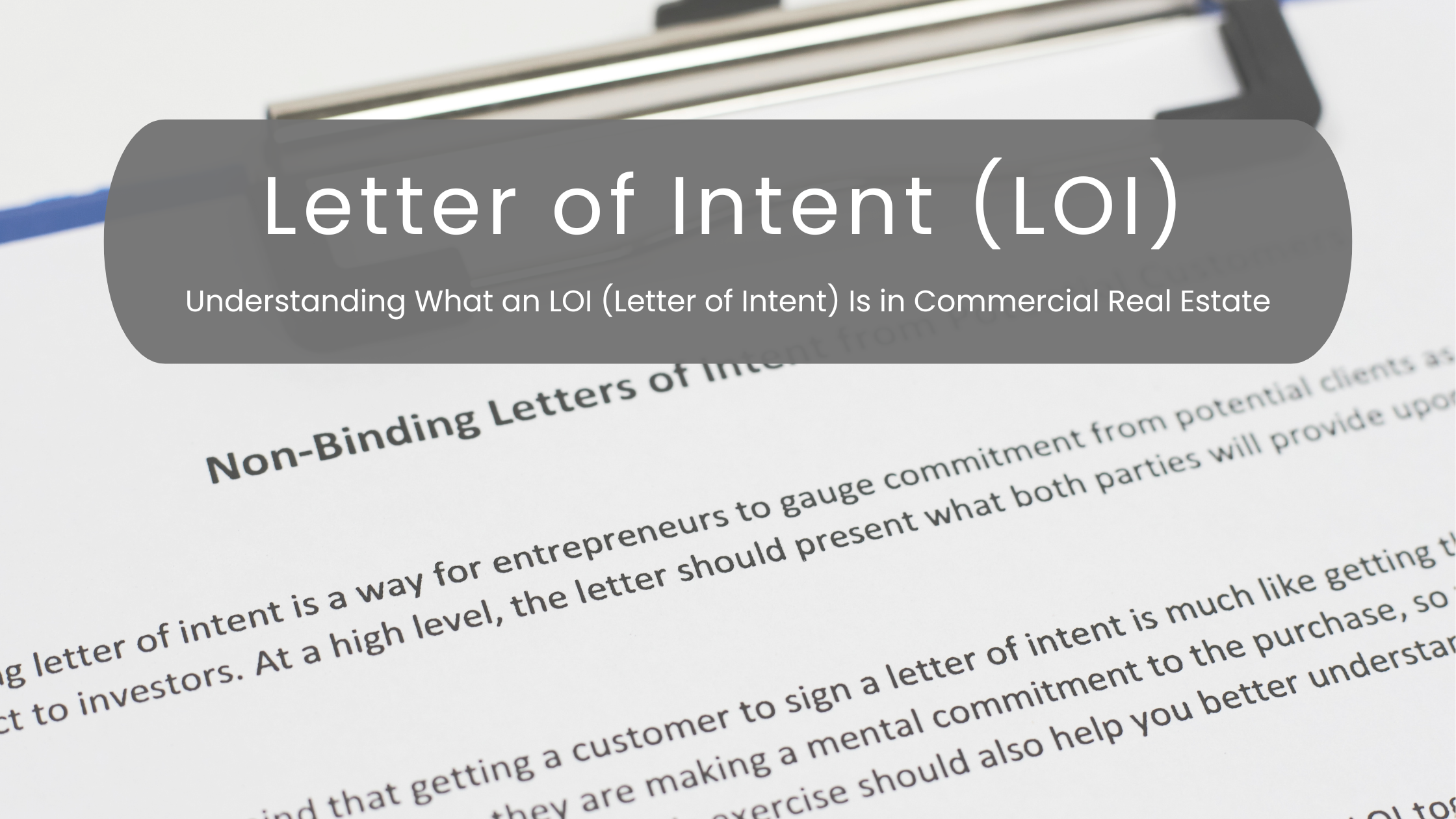Categories
Fundamentals, Letter of IntentPublished August 5, 2025
Understanding What an LOI (Letter of Intent) Is in Commercial Real Estate

Written by Shane Childers

By Childers Commercial Realty | ChildersCRE.com
When you're buying, selling, or leasing commercial real estate, one of the first major steps in formalizing a transaction is submitting or receiving a Letter of Intent, commonly referred to as an LOI. While not legally binding in most cases, this document plays a critical role in shaping the terms of a deal—and it’s important for property owners and investors to understand its purpose.
What Is an LOI?
A Letter of Intent (LOI) is a preliminary document used to outline the basic terms and intentions of a commercial real estate transaction—whether it’s a purchase, sale, or lease—before a formal agreement is signed.
Think of it as a roadmap for the deal. It allows both parties to agree on high-level terms before spending time and resources on detailed contracts or due diligence.
Where Does the LOI Fit in the Deal Process?
In most commercial real estate transactions, the LOI is introduced after initial interest has been established, but before attorneys are engaged to draft formal contracts or state form contracts are filled out.
Here’s how it typically fits in the overall deal timeline:
-
Initial Discussion & Property Marketing
The seller markets the property; buyers or tenants express interest. -
Information Gathering
Key property details, financials, and basic due diligence materials are shared to inform offer structure. -
LOI Submitted
Buyer or tenant outlines their proposed terms in an LOI. -
Negotiation of LOI
Both parties refine deal points (price, timeline, contingencies, etc.). -
Execution of LOI
Once both sides agree, the LOI is signed (non-binding in most cases). -
Formal Contract Drafting
Legal teams prepare the purchase agreement or lease. -
Due Diligence and Closing
When Should You Use an LOI?
You should use an LOI when both parties are serious about moving forward and want to clarify the key business terms before investing in legal drafting or full due diligence.
LOIs are common in deals involving:
-
Commercial land sales
-
Investment property purchases
-
Leasing office, retail, or industrial space
-
Build-to-suit or ground lease opportunities
They’re especially useful when multiple parties are involved (brokers, attorneys, lenders) or when deal terms are complex.
What Should Be Shared Before an LOI Is Submitted?
To help ensure that the LOI is informed and realistic, the seller should ideally provide:
-
A basic property overview (location, zoning, utilities)
-
Asking price or pricing guidance
-
Current rent roll or income info (if income-producing)
-
Known property conditions (e.g., roof age, mechanicals)
-
Survey or site plan, if available
-
Any recent inspections or reports (environmental, roof, etc.)
This helps the buyer prepare a fair and informed LOI—and can prevent re-negotiation later.
What Should Be Shared After an LOI Is Executed?
Once the LOI is signed, the seller should be prepared to provide more detailed due diligence items, such as:
-
Full financials and operating expenses
-
Leases, service contracts, or tenant estoppels
-
Title work and any existing liens or encumbrances
-
Updated surveys or environmental reports
-
Property tax statements
-
Zoning or permitting documentation
Buyers may also conduct site visits, inspections, and appraisals during this stage.
Common Elements of an LOI
While content varies by transaction, a typical LOI may include:
-
Purchase Price or Lease Terms
-
Property Description and Use
-
Due Diligence and Contingency Periods
-
Earnest Money Amounts
-
Timeline for Closing or Lease Commencement
-
Broker Representation
-
Confidentiality Clauses or “Exclusivity” Windows
Is an LOI Legally Binding?
In most cases, LOIs are not legally binding—but some provisions (like confidentiality or exclusive negotiation windows) may be enforceable if written that way. It’s important for both parties to clarify which sections are binding and which are not.
Work closely with your broker and legal team to ensure the language reflects your intentions.
Final Thoughts
A well-written LOI helps save time, reduce misunderstandings, and accelerate deals by getting everyone aligned early in the process. For sellers, it ensures the buyer is serious. For buyers, it allows due diligence to begin without unnecessary risk.
At Childers Commercial Realty, we help guide our clients through every step—from LOI to closing. Whether you're marketing land, selling an income-producing asset, or negotiating a lease, we ensure your deal is structured for success from the very beginning.
Have questions about LOIs or need help reviewing one?
Contact us at 765-413-6046 or visit ChildersCRE.com to connect with me to discuss your property.
Forgot Password?
Don't worry! It happens. Please enter the email address associated with your account.
Reset Password
Confirm Your Account
Search and view Exclusive Property Listings.
We'll never post to your social networks
Sign Up for Free
Create an account to save properties, receive alerts about new listings, view comparables, and obtain monthly market reports.
Almost there...
Your profile is almost complete! Just a few more details from you.
Welcome back!
We've missed you! Please enter your details.

Are you buying or selling a home?

When are you planning on buying a new home?

Are you pre-approved for a mortgage?

Would you like to schedule a consultation now?
When would you like us to call?
Thanks! We’ll give you a call as soon as possible.

When are you planning on selling your home?
Would you like to schedule a consultation or see your home value?
Please confirm your property details:
Please check the spelling, try clearing the search box, or try reformatting to match these examples:
Address: '123 Main St, Anytown'
Neighborhood: 'Downtown'
Zip: '98115'
City: 'Anytown' or 'Anytown, State/Province'
MLS number: 'MLS# 38065544'
